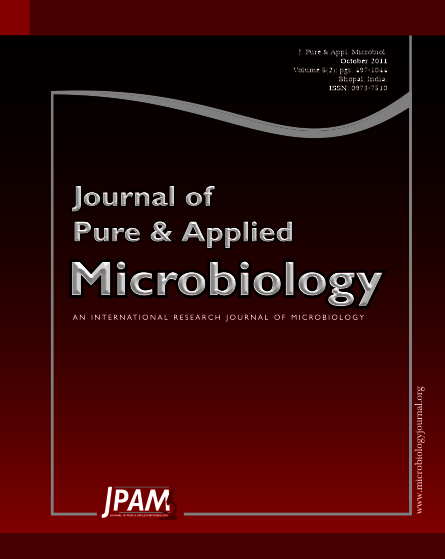Sheath blight (ShB) of rice, caused by Rhizoctonia solani is an economically significant disease throughout the world. Management of ShB using plant growth-promoting rhizobacteria (PGPR) is an ecologically-friendly and viable alternative to current use of chemical fungicides. To select efficacious PGPR strains, approximately 70 isolates were screened for their antagonistic activity on vegetative growth and sclerotial germination of
R. solani using dual in-vitro antibiosis assays. The strains were also screened for enhancement of rice seedling emergence under in vitro conditions. Ten PGPR strains were screened in each assay. In dual culture assays, mycelial plug of actively growing culture of R. solani was grown in Petri dishes containing 10% TSA and the PGPR strain was streak inoculated at 2 CM away on opposite sides. Plates were incubated at 250 C for 5 days and observations on mycelial inhibition of R. solani by PGPR were taken. Surface sterilized sclerotia of R. solani were treated with liquid PGPR inoculum for 24 h and later plated onto Petri dishes containing PDA. There were five replications for each PGPR strain. Sclerotial germination and growth inhibition were observed after incubating for 5 days at 250 C. To study the effect of PGPR strains on rice seedling vigor, surface sterilized rice seeds of Cv. Cocodrie in bacterial suspensions at a concentration of 4 x 108 cfu/ml for 24 h. The seeds were later dried and incubated for 7 days. There were 3 replications and 25 seeds for each replication. In vitro antibiosis assays showed that the majority of the strains significantly suppressed the mycelial growth of R. solani compared to the control. Similarly, four out of 70 strains tested significantly suppressed sclerotial germination when the sclerotia were treated with PGPR suspensions. Majority of the strains significantly increased seedling vigor when tested as seed treatments under in vitro conditions. The strains Bacillus amyloliquefaciens AP 219, B. subtilis strains MBI 600 and AP 52 performed the best in these assays.
Rice, Sheath blight, Rhizoctonia solani, Biocontrol, PGPR, Plant growth promotion
© The Author(s) 2011. Open Access. This article is distributed under the terms of the Creative Commons Attribution 4.0 International License which permits unrestricted use, sharing, distribution, and reproduction in any medium, provided you give appropriate credit to the original author(s) and the source, provide a link to the Creative Commons license, and indicate if changes were made.


